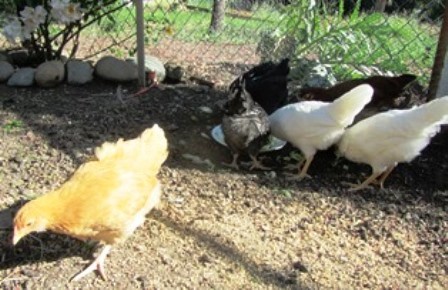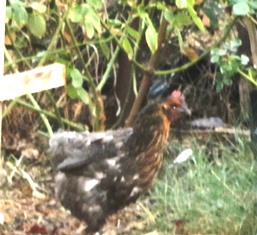New Rules Mean Happier Chickens, Healthier Eggs
The Obama administration has proposed new animal welfare standards that ban common practices governing chicken farms. Currently, an organic chicken farm may allow chickens outside to roam on concrete. The new rules specify the chickens must have access to the outside and to soil.
Currently, certified organic farms allow chickens to have a specific amount and quality of outdoor activity. But that doesn’t mean access to dirt for scratching, pecking, and dust bathing that are instinctive behaviors for chickens.
Under the proposed new rules to be certified organic eggs, the chickens producing them must be allowed 1.5 square feet of space per hen indoors and 2 square feet of space outdoors. Outdoor space must be at least half soil and not have a permanent roof or flooring.
The new rules means chickens can scratch, peck, and bathe in soil instead of being caged where they do not necessarily have access to soil. Current egg producers will have five years to implement the proposed changes that also specifiy no de-beaking of chickens.
Already, McDonalds and other large food corporations have advised that they’ll be making the transition to certified organic along with Walmart. Certified organic eggs under the new rules will mean more humane and better life for the chickens producing those eggs than for chickens whose eggs are labeled “cage-free.”
Currently, cage-free eggs mean the chickens producing those eggs do not necessarily get access to the outdoors as the new O’bama administration rules propose.
There will be a sixty day comment period before the rules can go into effect. But for animal protection advocates and supporters of the organic food movement, the new proposed rules are a welcome change.
* * *
If you enjoy reading about farmette topics (including gardening, beekeeping, and delicious recipes), check out my cozy mysteries A BEELINE TO MURDER and also THE MURDER OF A QUEEN BEE in the Henny Penny Farmette series (from Kensington Publishing).
Both are available through online retailers such as Amazon, Barnes & Noble, and Walmart as well as from traditional bookstores everywhere.
Now available in mass market paperback, this novel launched the Henny Penny Farmette series of mysteries and sold out its first press run.
The second cozy mystery in the Henny Penny Farmette series, available Sept. 29, 2016
Eggstra Confusing Egg Labels
Just because an egg is organic and from a cage-free chicken does not mean the eggs are free from Salmonella Enteritidis (the bacteria that causes the foodborne illness) or that the chickens producing the eggs live free of confinement.
Supermarkets carry dozens of eggs with labels like pasteurized or organic and also free-range, cage-free, or vegetarian. Consumers can find it confusing, so here’s the low-down on eggs and their labels.
CAGE FREE
This term relates to how the chicken is confined. The chickens are not raised in cages but may be confined in barns with floors. The floors may have pine shavings or other material and the chickens will likely have nesting boxes in which to lay eggs and roosts. But cage free does not necessarily mean they have lots of space; they could be living in close confinement with many other birds, depending on the farm.
ORGANIC
In order to get the USDA certification for organic on the eggs, the chickens must not be given hormones, antibiotics, and other drugs. The hens can be caged or otherwise confined, but usually they are cage free and eat an organic diet. The USDA stipulates that to qualify as organic eggs, the layers must be fed an organic diet of grains from land deemed free from toxic chemicals and pesticide for a minimum of three years and no grain from genetically-modified crops.
FREE RANGE
Chickens considered free range are able to leave their confinement and roam freely. Depending on the farm, the birds may be under a protective covering like a canopy. This keeps the flyers from escaping and the hawks from carrying away the birds. Free-range chickens might have a richer diet, again depending on the farm, because of greater access to freely foraging on grasses, grains, and seeds.
VEGETARIAN
How, you might wonder, can a chicken be deemed vegetarian when they naturally forage for grubs and worms? They are confined in cages and fed a vegetarian diet, free of animal and fish by-products.
PASTEURIZED
The eggs containing a pasteurized label have been put through a heating process while still in their shells. For three and one-half minutes, the eggs are heated to 140 degrees Fahrenheit, thereby killing the Salmonella bacteria. Pasteurized eggs are preferable for the diet of young children, elderly people, and those who have weakened immune systems and for whom a salmonella infection might have grave consequences. Even if you don’t buy pasteurized eggs, you can eliminate the risk of Salmonella infection if you cook the egg yolk and white until firm.
SAFETY TIPS
Eggs collected from your hen house should be washed within 36 hours of being collected and immediately refrigerated at 45 degrees Fahrenheit or below. These two steps can reduce the risk of Salmonella. Refrigeration prevents the bacteria (if present) from multiplying. Eggs purchased from the store should be immediately refrigerated. And if a recipe lists a raw egg as an ingredient (for example, mayonnaise or salad dressing or cake frosting), use pasteurized eggs or egg whites.
An egg from a pasture-raised hen is much more nutritious than an egg from a large commercial enterprise, according to Mother Earth News. The publication did a study in 2007 that measured how eggs from pastured hens stack up against the USDA’s nutrient data for commercial eggs. The results suggested that eggs from the pastured chickens were nutritionally superior. For the full story, see, http://www.motherearthnews.com/real-food/tests-reveal-healthier-eggs.aspx
• 1/3 less cholesterol
• 1/4 less saturated fat
• 2/3 more vitamin A
• 2 times more omega-3 fatty acids
• 3 times more vitamin E
• 7 times more beta caroten
It might be time to acquire a few more chickens if you love eggs as much as I do, especially in those big, mid-day farm table breakfast/lunches, with fresh veggies from the garden, and homemade bread and jam.
 Facebook
Facebook Goodreads
Goodreads LinkedIn
LinkedIn Meera Lester
Meera Lester Twitter
Twitter






